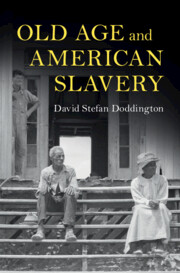Book contents
- Old Age and American Slavery
- Cambridge Studies on the American South
- Old Age and American Slavery
- Copyright page
- Dedication
- Contents
- Figures
- Tables
- Acknowledgments
- Introduction
- Part I The Enslaved
- 1 “As to those more advanced in life”
- 2 “Old and broken now; no tongue can tell how much I suffer”
- 3 “Young people think that old people are fools but old people know that young people are fools”
- 4 “Don’t kill such an old creature as I”
- 5 “You wont notice me now but you’ll wish you had”
- 6 “The summer of my life was passing away”
- Part II Enslavers
- Bibliography
- Index
3 - “Young people think that old people are fools but old people know that young people are fools”
Intergenerational Conflict Among the Enslaved
from Part I - The Enslaved
Published online by Cambridge University Press: 27 October 2023
- Old Age and American Slavery
- Cambridge Studies on the American South
- Old Age and American Slavery
- Copyright page
- Dedication
- Contents
- Figures
- Tables
- Acknowledgments
- Introduction
- Part I The Enslaved
- 1 “As to those more advanced in life”
- 2 “Old and broken now; no tongue can tell how much I suffer”
- 3 “Young people think that old people are fools but old people know that young people are fools”
- 4 “Don’t kill such an old creature as I”
- 5 “You wont notice me now but you’ll wish you had”
- 6 “The summer of my life was passing away”
- Part II Enslavers
- Bibliography
- Index
Summary
Enslaved people commonly claimed they sought to protect the aged from the excesses of their abusers, and were raised to respect their elders. Most scholarship on the topic reinforces this position, with an emphasis on support based on shared oppression and as a form of collective cultural resistance. This chapter, however, considers the consequences when enslaved people appropriated, internalized, or simply shared a belief that old age equated with diminished value and declining powers in work. Respect predicated on agedness was not always meant seriously nor received positively, and the transition to elder could be taken instead as an enforced relegation from the people one had once imagined as peers. The aged party sometimes resented and even resisted the imposition of such a label and its associated narrative, with such tension reflecting broader complexities surrounding age as a chronological, functional, and relational category and identity. People seen as elderly, but who struggled with this categorization of themselves, were forced to make choices – to accept, adapt, or to resist – and this could come at no little cost.
Keywords
- Type
- Chapter
- Information
- Old Age and American Slavery , pp. 105 - 135Publisher: Cambridge University PressPrint publication year: 2023



